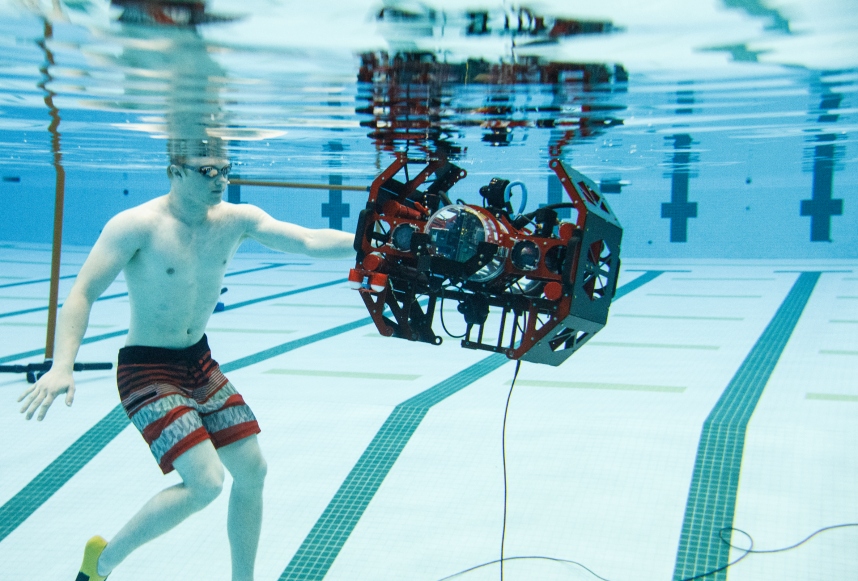
Mechanical team lead Ryan van Drecht swims with upgraded Auri at the launch event on July 7, 2018.
(Edmonton) Students from the University of Alberta electrical, mechanical, and computer engineering programs unveiled an underwater autonomous robot heading to the RoboSub 2018 competition in San Diego later this month.
Project lead and electrical engineering student Rumman Waqar says the team built off the design of last year's robot, Auri; this year's iteration has upgrades and brand-new features, including torpedo-firing capabilities and redesigned and rebuilt electrical components and communications systems.
This year's robot has been nicknamed the Fully Autonomous and Tested Auri, or FAT Auri. The design is based off Darth Vader's TIE Fighter, compliments of mechanical engineering student Ryan van Drecht, leader of the mechanical team. During the competition, FAT Auri will be lowered into a pool to complete a series of tasks and complete an obstacle course in 15 minutes.
"One of the biggest things is to keep it air-tight and waterproof," says Waqar. The team performs a dunk-test every time a new feature is added or upgraded, to prevent any leaks on competition day.
Other challenges, like providing the underwater robot with "senses" so it knows where it is and what to do next, are more sophisticated.
"When talking about land robots, you have a little bit more flexibility when moving around in terms of what you can sense, for example GPS. You know exactly where you are," says Waqar. "But underwater, all of these sensors disappear so it gets much, much harder to know exactly where you are and to move to another position."
From July 30 to Aug. 5 in San Diego, robots will face off in a 15-minute obstacle course as part of the annual RoboSub competition organized by the Association for Unmanned Vehicle Systems International.
"Last year, I think the biggest thing was to make all the pieces work individually, and even then we were 10th out of the 50 teams that came from all over the world," says Waqar. "But this year, we want to just go past that and go to that number one position."
The team has good reason to be confident. Business team leader Jon Machinski, who graduated from the computer science program last year, helped procure more sponsors and funds this year than ever before. Their annual budget has quadrupled over the past two years, from $13,000 in 2016 to over $53,000 in 2018.
Thanks to the increase in funding from sponsors and individuals who supported the team's fundraising campaign, the team was able to buy a $22,000 Nortek sensor that will take their robot to the next level in terms of co-ordination and mobility.